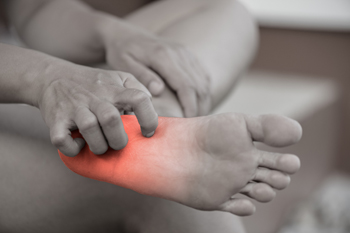Connect With Us
Blog
Items filtered by date: January 2023
History of Plantar Fasciitis

Plantar fasciitis is one of the most widespread afflictions of the foot that primarily affects the plantar fascia. It occurs when this part of the foot becomes aggravated and inflamed. Plantar fasciitis has an interesting history which may be helpful in knowing to learn more about this ailment. The condition was first described in the year 1812 by a man named Wood. Wood attributed the condition to tuberculosis at the time. Over the years, plantar fasciitis has gone by different names. For example, it has sometimes been called painful heel syndrome or subcalcaneal pain. As time progressed and the field of podiatry developed, modern science learned more about plantar fasciitis. Today, it is one of the most common conditions that modern podiatrists are trained in identifying and treating. If you believe that you may have plantar fasciitis, contact a podiatrist today.
Plantar fasciitis can be very painful and inconvenient. If you are experiencing heel pain or symptoms of plantar fasciitis, contact one of our podiatrists from Florida Foot & Ankle Group, P.A.. Our doctors can provide the care you need to keep you pain-free and on your feet.
What Is Plantar Fasciitis?
Plantar fasciitis is the inflammation of the thick band of tissue that runs along the bottom of your foot, known as the plantar fascia, and causes mild to severe heel pain.
What Causes Plantar Fasciitis?
- Excessive running
- Non-supportive shoes
- Overpronation
- Repeated stretching and tearing of the plantar fascia
How Can It Be Treated?
- Conservative measures – anti-inflammatories, ice packs, stretching exercises, physical therapy, orthotic devices
- Shockwave therapy – sound waves are sent to the affected area to facilitate healing and are usually used for chronic cases of plantar fasciitis
- Surgery – usually only used as a last resort when all else fails. The plantar fascia can be surgically detached from the heel
While very treatable, plantar fasciitis is definitely not something that should be ignored. Especially in severe cases, speaking to your doctor right away is highly recommended to avoid complications and severe heel pain. Your podiatrist can work with you to provide the appropriate treatment options tailored to your condition.
If you have any questions please feel free to contact one of our offices located in Debary, Lake Mary, Orlando, and Oviedo, FL . We offer the newest diagnostic and treatment technologies for all your foot and ankle needs.
Medical Conditions May Cause Cracked Heels

Cracked heels are an uncomfortable foot condition that can develop for various reasons. These can include wearing shoes that do not have a back or standing on hard surfaces for most of the day. Dry skin may also contribute to developing cracked heels and may come from having specific medical conditions. These can include eczema, psoriasis, or hyperkeratosis, which can happen from participating in sporting activities that consistently rub the skin. Additionally, a thyroid disorder may cause the skin to become dry, possibly leading to cracked heels, and it is not uncommon for diabetic patients to have this condition as well. Mild relief may be found when the feet are soaked in warm water, followed by applying a good moisturizer. Wearing cushioned socks may help to protect the heels from rubbing against the shoes. Cracked heels can become infected so it is strongly suggested that you are under the care of a podiatrist who can prescribe medication that can begin effective treatment.
If the skin on your feet starts to crack, you may want to see a podiatrist to find treatment. If you have any concerns, contact one of our podiatrists from Florida Foot & Ankle Group, P.A.. Our doctors can provide the care you need to keep you pain-free and on your feet.
Cracked Heels
It is important to moisturize your cracked heels in order to prevent pain, bleeding, and infection. The reason cracked heels form is because the skin on the foot is too dry to support the immense pressure placed on them. When the foot expands, the dry skin on the foot begins to split.
Ways to Help Heal Them
- Invest in a good foot cream
- Try Using Petroleum Jelly
- Ease up on Soaps
- Drink Plenty of Water
Ways to Prevent Cracked Heels
- Moisturize After Showering
- Skip a Shower
- Keep Shower Water Lukewarm
- Don’t Scrub Your Feet
If you are unsure how to proceed in treating cracked heels, seek guidance from a podiatrist. Your doctor will help you with any questions or information you may need.
If you have any questions, please feel free to contact one of our offices located in Debary, Lake Mary, Orlando, and Oviedo, FL . We offer the newest diagnostic and treatment technologies for all your foot care needs.
Common Symptoms of Neuropathy

The feet are typically affected with the condition that is known as peripheral neuropathy. It causes the inability to feel sensations on the feet, and existing cuts, bruises, and scrapes may go unnoticed. There are various categories of specific types of nerves, consisting of sensory, motor, and autonomic nerves. Pain and touch are products of the sensory nerves, while the motor nerves control the muscles. Automatic functions of the body come from the autonomic nerves, and bladder function and blood pressure fall into this area. The symptoms that many people experience with neuropathy can include a loss of balance, weakness in the feet, in addition to a tingling or numbing sensation in the hands and feet. Diabetic patients may be prone to developing neuropathy, and infected cuts on the feet may go unnoticed, possibly leading to serious complications. If you have any symptoms that may indicate neuropathy, it is suggested that you consult with a podiatrist who can help you to manage this condition.
Neuropathy
Neuropathy can be a potentially serious condition, especially if it is left undiagnosed. If you have any concerns that you may be experiencing nerve loss in your feet, consult with one of our podiatrists from Florida Foot & Ankle Group, P.A.. Our doctors will assess your condition and provide you with quality foot and ankle treatment for neuropathy.
What Is Neuropathy?
Neuropathy is a condition that leads to damage to the nerves in the body. Peripheral neuropathy, or neuropathy that affects your peripheral nervous system, usually occurs in the feet. Neuropathy can be triggered by a number of different causes. Such causes include diabetes, infections, cancers, disorders, and toxic substances.
Symptoms of Neuropathy Include:
- Numbness
- Sensation loss
- Prickling and tingling sensations
- Throbbing, freezing, burning pains
- Muscle weakness
Those with diabetes are at serious risk due to being unable to feel an ulcer on their feet. Diabetics usually also suffer from poor blood circulation. This can lead to the wound not healing, infections occurring, and the limb may have to be amputated.
Treatment
To treat neuropathy in the foot, podiatrists will first diagnose the cause of the neuropathy. Figuring out the underlying cause of the neuropathy will allow the podiatrist to prescribe the best treatment, whether it be caused by diabetes, toxic substance exposure, infection, etc. If the nerve has not died, then it’s possible that sensation may be able to return to the foot.
Pain medication may be issued for pain. Electrical nerve stimulation can be used to stimulate nerves. If the neuropathy is caused from pressure on the nerves, then surgery may be necessary.
If you have any questions, please feel free to contact one of our offices located in Debary, Lake Mary, Orlando, and Oviedo, FL . We offer the newest diagnostic and treatment technologies for all your foot care needs.
Blog Archives
- April 2025
- March 2025
- February 2025
- January 2025
- December 2024
- November 2024
- October 2024
- September 2024
- August 2024
- July 2024
- June 2024
- May 2024
- April 2024
- March 2024
- February 2024
- January 2024
- December 2023
- September 2023
- August 2023
- June 2023
- May 2023
- April 2023
- March 2023
- February 2023
- January 2023
- December 2022
- November 2022
- October 2022
- September 2022
- August 2022
- July 2022
- June 2022
- April 2022
- March 2022
- February 2022
- January 2022
- December 2021
- October 2021
- September 2021
- August 2021
- July 2021
- June 2021
- May 2021
- April 2021
- March 2021
- February 2021
- January 2021
- December 2020
- November 2020
- October 2020
- September 2020
- August 2020
- July 2020
- June 2020
- May 2020
- April 2020
- March 2020
- February 2020
- January 2020
- December 2019
- November 2019
- October 2019
- September 2019
- August 2019
- July 2019
- June 2019
- May 2019
- April 2019
- March 2019
- February 2019
- January 2019
- December 2018
- November 2018
- October 2018
- September 2018
- August 2018
- July 2018
- June 2018
- May 2018
- April 2018
- March 2018
- February 2018
- January 2018
